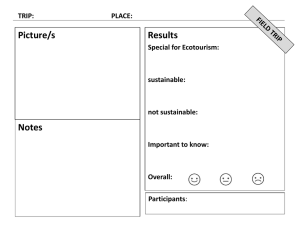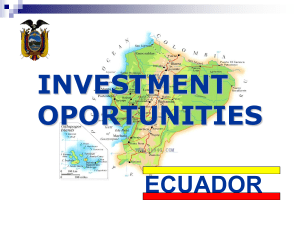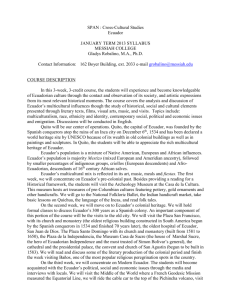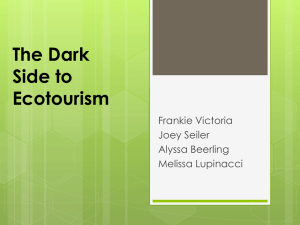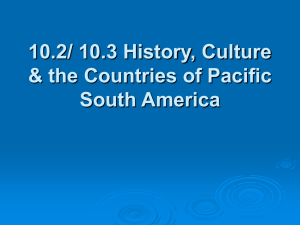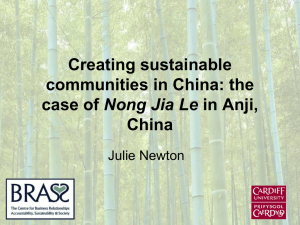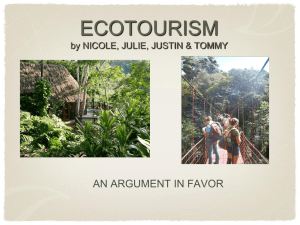GC 295 Special Topics in Geography
advertisement
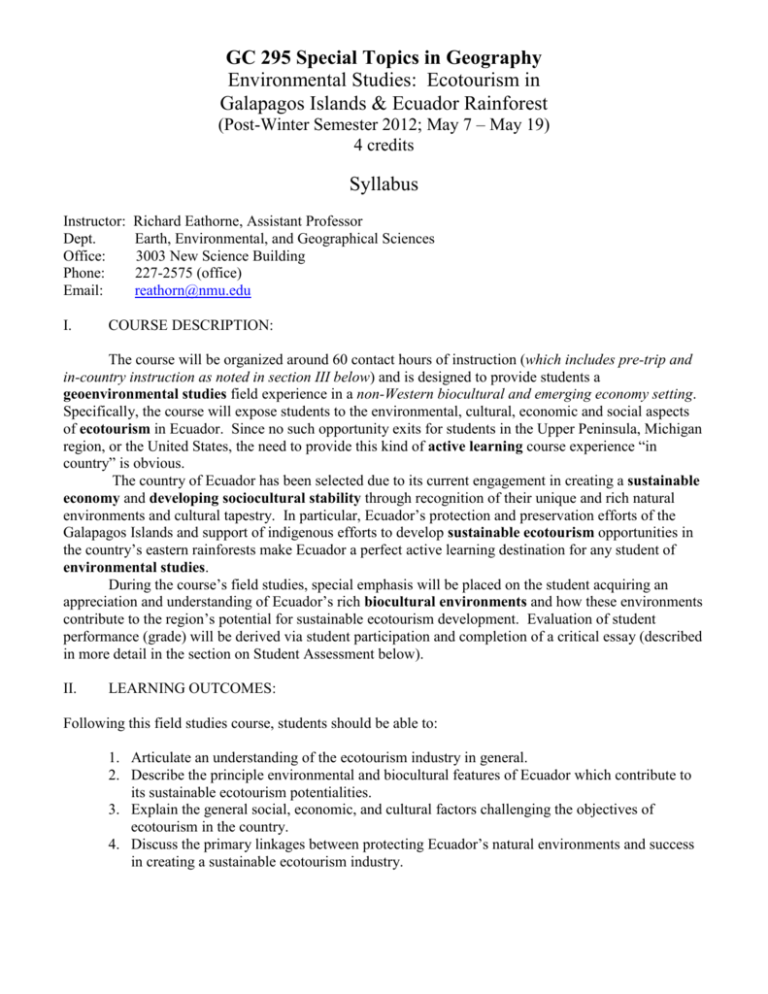
GC 295 Special Topics in Geography Environmental Studies: Ecotourism in Galapagos Islands & Ecuador Rainforest (Post-Winter Semester 2012; May 7 – May 19) 4 credits Syllabus Instructor: Dept. Office: Phone: Email: I. Richard Eathorne, Assistant Professor Earth, Environmental, and Geographical Sciences 3003 New Science Building 227-2575 (office) reathorn@nmu.edu COURSE DESCRIPTION: The course will be organized around 60 contact hours of instruction (which includes pre-trip and in-country instruction as noted in section III below) and is designed to provide students a geoenvironmental studies field experience in a non-Western biocultural and emerging economy setting. Specifically, the course will expose students to the environmental, cultural, economic and social aspects of ecotourism in Ecuador. Since no such opportunity exits for students in the Upper Peninsula, Michigan region, or the United States, the need to provide this kind of active learning course experience “in country” is obvious. The country of Ecuador has been selected due to its current engagement in creating a sustainable economy and developing sociocultural stability through recognition of their unique and rich natural environments and cultural tapestry. In particular, Ecuador’s protection and preservation efforts of the Galapagos Islands and support of indigenous efforts to develop sustainable ecotourism opportunities in the country’s eastern rainforests make Ecuador a perfect active learning destination for any student of environmental studies. During the course’s field studies, special emphasis will be placed on the student acquiring an appreciation and understanding of Ecuador’s rich biocultural environments and how these environments contribute to the region’s potential for sustainable ecotourism development. Evaluation of student performance (grade) will be derived via student participation and completion of a critical essay (described in more detail in the section on Student Assessment below). II. LEARNING OUTCOMES: Following this field studies course, students should be able to: 1. Articulate an understanding of the ecotourism industry in general. 2. Describe the principle environmental and biocultural features of Ecuador which contribute to its sustainable ecotourism potentialities. 3. Explain the general social, economic, and cultural factors challenging the objectives of ecotourism in the country. 4. Discuss the primary linkages between protecting Ecuador’s natural environments and success in creating a sustainable ecotourism industry. III. COURSE STRUCTURE (Pre-trip and in-country) There will be a total of 8 hours pre-trip classroom discussion, reading assignments, exam, and brief class presentations, as well as a minimum of 60 contact hours in country of field experience interaction, interviews with ecotourism operators and local community members. Additionally, there will be daily formal group meetings for reflection, discussion and evaluation of the day’s experiences. Structured class meetings in country will take place twice daily during the trip: students will meet with the instructor for 1 hour prior to the day’s itinerary, and for 1 hour at day’s end to discuss experiences and assess observations. Active learning and student/instructor interaction will, of course, take place throughout the day’s activities. IV. TEXTBOOKS: Required: NONE Recommended for reference/reading: Tourism and Responsibility: Perspectives from Latin America and the Caribbean, by Martin Mowforth, Clive Charlton and Ian Munt, 2008 Tourism in Latin America, by Les Lumsdon and Jonathan Swift, 2001 Ecuador Handbook, by Julian Smith, Moon Publications, (most recent edition) Ecuador and the Galapagos Islands, by Rob Rachowiecki, Lonely Planet Publications (most recent edition) The Ecotourist’s Guide to the Ecuadorian Amazon, by Rolf Wesch, 1997 Amazon Worlds, by Noemi Paymal, 1993 Savages, by Joe Kane, 1995 Galapagos: A Natural History, by Michael Jackson, 1993 Ecotourism and Sustainable Development: Who Owns Paradise, by Martha Honey, 1999 Sustainable Tourism, by C. Michael Hal and Allan Lew, (most current edition) Ecotourism: An Introduction, by David A Fennell, (most current edition) V. READING ASSIGNMENTS: Selections from the Recommended Reading List will be provided and Internet selections assigned. Students will receive a take home exam during pre-trip meeting # 8 to be completed and returned to instructor prior to departure. VI. CLASS MEETINGS and PARTICIPATION There will be eight (8) one-hour meetings scheduled throughout the Winter 2012 semester. Specific dates and times to be arranged. Students are expected to attend and participate in class in preparation for the field studies portion of the course. These classes will cover topics such as ecotourism, Ecuadorian geography, history and culture. Meetings will include student presentations on sites to be visited in the country. Finally, all students will participate in International Programs Office two hours of pre-departure orientation addressing general crosscultural and risk/safety management strategies. Class Meeting 1: Instructor lecture on general itinerary, travel behavior, rules and responsibilities Class Meeting 2: Instructor lecture on Ecuadorian people, ecotourism, general geography, and cultural orientation of Ecuador Class Meeting 3: Student presentations on physical geography of Ecuador Class Meeting 4: Student presentations on cultural geography of Ecuador Class Meeting 5: Student presentations on economic geography of Ecuador Class Meeting 6: Student presentations on political geography of Ecuador Class Meeting 7: Student presentations on environmental issues of Ecuador Class Meeting 8: Student presentations of in-country destinations. General question and answers session. Distribute “Take-Home Exam” VII. ATTENDANCE: Pre-trip classes: Required In-country activities: Required VIII. EVALUATION and ASSESSMENT XI. Pre-trip reading, presentations, and take-home exam (due prior to departure) Daily field notes discussion and assessment (due on site) Critical Essay (due ) Grading: Percent of Grade Attendance at pre-trip meetings. 20% Presentations and class participation 20% Assigned readings exam 20% Final paper 40% 100% CRITICAL ESSAY GUIDLINES 1. 3,000 word minimum, double spaced. 2. Title: Important! Must contain “content” and “command” word(s). 3. Select an Ecuadorian ecotourism topic from readings, field notes, or observations. Ecuador. 4. Introduction: Briefly review “just the facts” of the situation (the origins of the issue / problem, its current situation, the “players,” the geographical location, etc.) 5. Argument (why the concern, why should anyone care?) Explain why the issue you have selected is a “problem” by placing it within a larger social, economic or political context. In other words, why should anyone care or be concerned beyond those immediately affected by the situation? 6. Analysis: What’s being done to address the problems emerging from the issue generated from the topic? Who’s doing what? What specific actions are being taken by whom, to whom, etc.? 7. Critical Commentary: What’s your position? Who’s “right,” “wrong?” Is everyone missing the big picture? Do you have anther approach? Why?
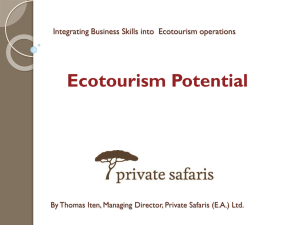
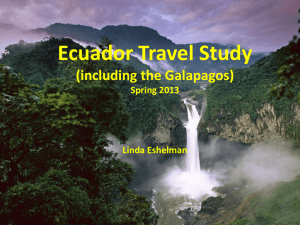
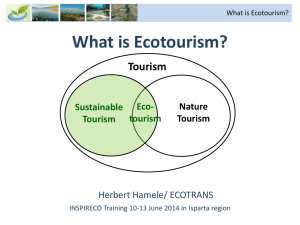
![Ecotourism_revision[1]](http://s2.studylib.net/store/data/005398532_1-116d224f2d342440647524cbb34c0a0a-300x300.png)
